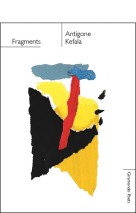I read Fragments cover-to-cover soon after it was published last September. Not a week has gone by since that I haven’t dipped into it and enjoyed its elegance.
Kefala’s first collection in 20 years contains alabaster-smooth poetry—sparsely beautiful. The work also feels spacious—leaving the reader room to breathe and stretch a bit. Such accessibility and openness can be difficult to achieve in poems of five lines or less (of which there are quite a few) but I found no evidence that Kefala had struggled with it.
These are confident poems from a minimalist writer whose work I’d encourage you to explore further. To tempt you to do this, here’s a taste of the poems, and my brief description of them, plus the link to Giramondo publishing so you can order the collection.
‘Letter II’ contains the bald last line: ‘in an unbearable distance’. The line packs a raw punch of melancholy—an impact made possible thanks to the perfect description of light that precedes it.
‘Metro Cellist’ could be set in quite a number of cities across the world. However, when Kefala’s poem says that in the ‘tiled tombs’ of the metro, the earth is ‘singing in an exuberance of / youth’, I immediately think of Sydney’s Central Station.
‘Lunchtime’ is set on some grass beneath an office tower where a man is revived after what might have been a cardiac arrest (given his ashen face): ‘they opened his shirt / slapped his face gently / called him back to the street / the traffic / the winter day.’ The incident is described so well I almost feel I must have been there.
In ‘Bowls Player’, a poem of just four lines, a woman dresses in her whites and escapes each day to the bowling green (at least that’s where I presume she goes) so as ‘not to be consumed / in the house by his death’.
‘Transformation’ describes the way we look at our own face and the faces of others ‘to find our future face’—always on the lookout for ‘untraceable changes’.
In ‘Weapons’ the words are less lyrical. They fit perfectly with the subject matter of ‘men holding on, hugging / their metal erections / … to breed another race of killers’.
‘Birthday Party’ poignantly describes a celebration for an elderly woman who is frail and ‘folding inwardly’. It’s an unsettling poem, not least because I empathised with the woman but also those who attended the party and displayed ‘an exaggerated edge / to our caring, unnerved / by this transformation’.
‘On Loss’ evokes the pain of losing a loved one. It also explores the angst of discovering that life goes on despite their death. It reminded me a little of W.H. Auden’s poem ‘Musée des Beaux Arts’ about Brueghel’s painting ‘Landscape with the Fall of Icarus’. Kefala’s poem says, ‘Death needs no one / comes wrapped in self-sufficiency. Do you hear?’ And while I think the question ‘Do you hear?’ is most obviously addressed to the reader, it can also be read as a cry to the person who is gone. It’s a cry that’s infused with anger and frustration at being abandoned, and I found hints of this fury—along with mentions of the less tempestuous sides of grief—threaded throughout the collection.
In ‘Winter afternoon’ a woman tells another person her news over coffee. It’s an everyday activity that Kefala lifts into weirder more alienating territory through showing us ‘the seagulls / icy white with red eyes / shrieking above the beach’.
This is a fine collection from a writer who is exploring what growing older and facing mortality (your own and that of others) might mean. Her keenness of eye and precise description makes her a poet I can trust to open up life’s deep and perennial questions to me.
Fragments
Antigone Kefala
Giramondo, $24




Recent Comments